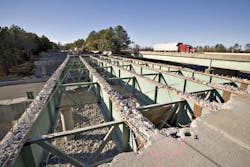House transpo panel calls for revenue source to fund freight infrastructure
This morning, the bipartisan Panel on 21st Century Freight Transportation of the House Transportation & Infrastructure Committee issued its final report on “Improving the Nation’s Freight Transportation System” with the stated goal of strengthening the U.S. economy.
Approved unanimously, the panel’s recommendations include calling for Congress to:
- Establish a national freight transportation policy and a national, multimodal freight network
- Ensure “robust public investment” in all modes of freight-related transportation
- Identify sustainable sources of revenue for investing in the nation’s multimodal freight network
- Develop specific funding and revenue options for freight-transportation projects before considering the reauthorization of the surface transportation in 2014
The panel’s research included six public hearings, three roundtable discussions, tours of freight facilities in Southern California, the Memphis region, the New York City/Northern New Jersey region, and Norfolk, VA, and briefings with freight-industry stakeholders and other interested parties.
Reflecting what it learned from those activities, the panel’s final report recommends that to “safely and efficiently meet the needs of freight movement in the 21st century,” Congress should do the following
- Direct the Secretary of Transportation, in coordination with the Secretary of the Army and the Commandant of the U.S. Coast Guard, to establish a comprehensive national freight transportation policy and designate a national, multimodal freight network
- Ensure robust public investment in all modes of transportation on which freight movement relies, and incentivize additional private investment in freight transportation facilities, to maintain and improve the condition and performance of the freight transportation network
- Promote and expedite the development and delivery of projects and activities that improve and facilitate the efficient movement of goods
- Authorize dedicated, sustainable funding for multimodal freight ‘Projects of National and Regional Significance’ through a grant process and establish clear benchmarks for project selection. Projects eligible for such funding would have a regional or national impact on the overall performance of the multimodal freight network identified by the Secretary of Transportation;
- Direct the Secretary of Transportation, in coordination with the Secretary of the Treasury and the Secretary of the Army, to identify and recommend sustainable sources of revenue across all modes of transportation that would provide the necessary investment in the Nation’s multimodal freight network and align contributions with use of, and expected benefit of increased investment in, such network
- Review, working through the [House] Committee on Transportation and Infrastructure and the Committee on Ways and Means, the Secretary’s freight funding and revenue recommendations and develop specific funding and revenue options for freight transportation projects prior to Congress’ consideration of the surface transportation reauthorization bill in 2014.
The special panel was led by its Chairman, Rep. John J. Duncan, Jr. (R-TN), and Ranking Member Rep. Jerrold Nadler (D-NY). The panel was set up back in April by the full committee’s Chairman, Rep. Bill Shuster (R-PA), and its Ranking Member, Rep. Nick J. Rahall, II (D-WV).
“Moving goods and people effectively depends on all modes of transportation, which made the work and insight of this special panel so necessary to the Committee’s legislative priorities,” noted Rep. Shuster.
“The smooth movement of cargo across our transportation network is an essential ingredient in increasing American competitiveness and growing American jobs,” said Rep. Rahall. “The substantive and insightful recommendations made by this bipartisan panel will be of tremendous benefit to our Committee as we craft the next surface transportation bill and look to spur investment in all our transportation modes.”
Rep. Duncan observed that “bottlenecks at any point in the transportation system can seriously impede freight mobility and drive up the cost of the goods” so “improving the efficient and safe flow of freight across all modes of transportation directly impacts the health of the economy.”
“Over the past six months,” remarked Rep. Nadler, “we have had an opportunity to focus on how best to strengthen the freight network – across all modes of transportation – to meet current and future goods movement demands… I fully support this bipartisan report, signed by every Member of the Panel, and believe we have made a great start.”
Along with Duncan and Nadler, the Panel on 21st Century Freight Transportation included Republican members Gary Miller (CA), Rick Crawford (AR), Richard Hanna (NY), Daniel Webster (FL), and Markwayne Mullin (OK); and Democratic members Corrine Brown (FL), Daniel Lipinski (IL), Albio Sires (NJ), and Janice Hahn (CA).
